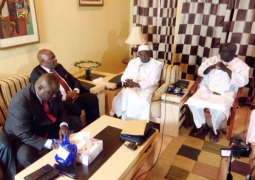Allah’s Messenger continued to communicate Allah’s vocation very eagerly and sincerely for more than twenty years. He bore the heavy and precious burden. He was not heavily encumbered by the major trust on earth, that is, the burden of whole humanity, creed, strife and industry in various domains. He experienced the painstaking g and persistent battle for more than twenty years. No matter distracted him from another since the moment he heard the great divine call and received the solemn obligation. May Allah give him the best reward in return for what he presented to us all humanity.
The following pages will include but simple excerpts of the laborious long struggle which he made during this period.
The categories of revelation
Before going in the subject of such struggle, I see that it is best to move to the categories of revelation. Ibnl-Qayyem said that the category if revelations are as follows:
1.True vision which were the first precursors of Prophethood.
2.What the angel threw into his heart mind (of the divine inspirations) without seeing him really. The Prophet (PBUH) said: “The Holy Spirit gave the inspiration that nobody will die till they have received their sustenance in full. So fear Allah and beg His bounty in a good manner. Don’t be impelled by the delay of sustenance to get it through misdeeds, for, surely, what is with Allah is obtained through obedience to Him.”
3.The angel would appear to the Prophet (PBUH) in the form of a man who was speaking to him directly. In this category the Prophet’s Companions sometimes saw such a man.
4.What the received and looked like the clangs of a bell. These moments were so hard for him. The angel was sitting beside the Prophet and in this case the Prophet’s forehead used to ooze sweat on the coldest day. Sometimes his riding camel would keel down if he was riding it. Once revelation came to him when his thigh was over that of Zaid Ibn Thabit, which could bruise it owing to heaviness.
5.The Prophet (PBUH) saw the angel in his real form to reveal to him what Allah wills. This occurred twice as Allah pointed out in the chapter of An-Najm. (53).
6.What Allah revealed to him when he was over the heavens on the night of Al-Me ‘raj (Ascent). A good example of this can be the prescription of prayer.
7.Allah’s talk to the Prophet (PBUH) without the medium of an angel as He (Allah) talked to Moses Ibn Imran. This type is confirmed with regard to Moses through the Quranic text. While it is established to the Prophet (PBUH) through the hadith of Al-Israa (the nocturnal Journey)
Some scholars added another type, i.e. Allah’s direct talk to the Prophet. But this very issue is controversial.
The First Stage - Struggle for communicating Allah’s Calling
Three-year-old secret vocation:
The Prophet (PBUH) began to invite secretly people to the worship of Allah immediately after the revelation of the chapter of Al-Muddathir. The reason why the vocation was secret in its beginning are:
1-the Prophet’s people were ungracious and discourteous;
2- They have no religion but idolatry which they adopted on the pretext that they found their forefathers involved in it;
3- They were in the habit of resorting to violence when resolving problems. In spite of that, they appropriated religious leadership across
The Leading group:
It was normal that the Prophet (PBUH) being his mission by inviting the closest relatives and friends as well as the good-natured people whom he knew well to Islam. They were well-known for advocating and liking truth and good. The Prophet (PBUH) was noted for telling the truth and reputable acts. A group of such people accepted his invitation without a vestige of doubt or hesitation. They are known in Islamic history as the early Muslim forerunners, at the forefront of who were Khadija, the Prophet’s wife, Zaid Ibn Haritha Ibn Sharahil Al-Kalby who was the Prophet’s freed slave, Ali Ibn Talib, the Prophet’s cousin who was under his care, and his closest friend Abu Bakr As-Siddiq. All of them embraced Islam on the first day of the calling.
Abu Bark was a popular, flexible, well-mannered, sociable and friendly. People liked associating with him because of his knowledge, trade and kind treatment. Therefore, he actively invited all those whom he trusted from among his people to Islam. Through his invitation ‘Uthman Ibn Affan, Az-Zubair Ibnul-Awwam, Abdur-Rahman Ibn Awf, Sa’ad Ibn Abu Waqqas and Talhah Ibn ‘Ubaidullah embraced Islam. These people were the leading and early Muslims.
As for the people accepted Islam after them, they were Abu ‘Ubaida Ibnul-Jarrah, Abu Salama Ibn Abdul-Asad and his wife his two Umm Salama, Al-Arqam Ibn Abul-Arqam, ‘Uthman Ibn Maz’un and two brothers Qudama and Abdullah, ‘Ubaida Ibnul-Harith Ibnul-Muttalib Ibn Abd Manaf, Sa’id Ibn Zaid and his wife Fatima bint Al-Khattab, Khabbab Ibnul-Aratt, Ja’afar Ibn Abu Talib and his wife Asmaa bint Umais, Khaled Ibn Sa’id Ibnul-Ass and his wife Amena bint Khalaf then his brother ‘Amr Ibn Sa’id Ibnul-Ass, Hatib Ibnul-Harith and his wife Fatima bint Al-Mujallel, his brother Al-Khattb Ibnul-Harith and his wife Fukaiha bint Yasar, Ma amar Ibnul-Harith, Al-Muttaib Ibn Azhar, Ramlah bint Abu ‘Awf and Na’eem Ibn Abdullah Ibnun-Nahham. They all belonged to various septs and phratries of Quraish.
Among the early Muslims who belonged to other tribes were Abdullah Ibn Mas’ud, Mas’ud Ibn Rabi’a Al-Qary, Abdullah Ibn Jahsh and his brother Abu Ahmad Ibn Jahsh, Bilal Ibn Abu Rabah, Suhaib Ibn Sinan Ar-Rumy, Ammar Ibn Yasir and his parents Yasir and Sumayya and Amer Ibn Fuhairah. There were also some other women who accepted Islam such as Umm Ayman Baraka Al-Habasheyya, Ummul-Fadl Lubaba bin Al-Harith Al-Hilaleyya, the wife of Al-Abbas Ibn ‘Abdul-Muttalib and Asmaa bint Abu Bakr As-Siddiq
Through close scrutiny and induction it becomes clear that the number of those known as the early Muslims reached one hundred and thirty men and women. But the fact that whether they all embraced Islam before proclaiming the vocation or some of them entered Islam later is not known.
Prescribing Salat (prayer):
Prayer was the first religious obligation that Allah imposed upon the Prophet (PBUH) and the Muslims. Ibn Hajar said: “Before the Journey of Al-Israa, the Prophet (PBUH) and his Companions used to perform prayer. But scholars differ as to whether one of the five prayers was prescribed before or not. Some scholars say that there were two obligatory prayers, one that was to be observed before sunrise and another that had to be offered prior to sunset”. Zaid Ibn Haritha was reported to have said: “The first time the Prophet (PBUH) received revelation, Gabriel came to him to teach him how to make wud’u (ablution). When he finished, he took a handful of water and sprinkled therewith his private parts,” Ibn Majah also narrated a hadith to that effect. Al-Barraa Ibn Azeb and Ibn ‘Abbas reported something similar to it. On the other hand, Ibn Hisham stated that something similar to it. On the other hand, Ibn Hisham stated that the Prophet (PBUH) and his Companions went to the passes of
Prayer was the only act of worship Muslims were ordered to perform. All religious rulings connected with prayer with the exception of some directives and issues that clarified the various aspects of monotheism, exhorted Muslims to self-purification and good morals and described
To be continued
Read Other Articles In Article (Archive)

Jammeh never said he is not stepping down, says African Bar Association
Dec 22, 2016, 10:05 AM



